E703 Advanced Econometrics I - Universität Mannheim
E703 Advanced Econometrics I - Universität Mannheim
E703 Advanced Econometrics I - Universität Mannheim
Create successful ePaper yourself
Turn your PDF publications into a flip-book with our unique Google optimized e-Paper software.
<strong>Universität</strong> <strong>Mannheim</strong> Fall Semester 2012<br />
Department of Economics Professor Andrea Weber<br />
<strong>E703</strong> <strong>Advanced</strong> <strong>Econometrics</strong> I<br />
Syllabus –Sept/03/2012<br />
Course Overview and Objectives:<br />
This course will introduce the statistical analysis of linear models, as applied to economic<br />
data. The first part of the course will be devoted to the formal derivation of the theoretical<br />
foundations of the linear regression model. The second part focuses on applications of<br />
this theory to particular problems in the analysis of economic data.<br />
By the end of the course, students should have a firm grasp of the fundametals of<br />
econometric theory and a critical understanding of sensible applications of econometric<br />
methods to empirical problems.<br />
Time and Place:<br />
Lectures: Tuesday, 10:15 – 11:45, Thursday, 10:15 – 11:45; L7, 001<br />
First Lecture: October 9<br />
Exercise Sections: 1) Monday, 8:30 – 10:00 (Andreas Landmann, L9, 1-2, 003)<br />
2) Monday, 10:15 – 11:45 (Andreas Landmann, L9, 1-2, 003)<br />
3) Friday, 8:30 – 10:00 (Andreas Landmann, L9, 1-2, 003)<br />
Exercise sessions start in the week of October 8.<br />
Contact and Office Hours<br />
Professor Andrea Weber, L7, 3-5, Room 4.20, a.weber@uni-mannheim.de<br />
Office hours: Tuesday 14:00 – 15:00.<br />
Appointment: if you cannot make the office hours, send an email and request an<br />
appointment<br />
Teaching Assisitant:<br />
Andreas Landmann, andreas.landmann@uni-mannheim.de, office hours by appointment.<br />
Course Requirements:<br />
The course is intended for Masters and first year PhD students from the GESS program.<br />
Students should have prior knowledge of undergraduate level econometrics. Working<br />
knowledge of basic probability theory, differential calculus, linear algebra and matrix<br />
algebra are also assumed. Attendance in the lectures and exercise sessions are mandatory.<br />
Exercise sessions are organized such that there are smaller exercise groups with about 20<br />
students each. Preparing reading assignments, attempting exercise questions ahead of<br />
each session, and taking active part during the course of the sessions are essential.<br />
Important: If you have not taken an undergraduate econometrics course, preparatory reading<br />
is strongly advised, for example:<br />
Stock and Watson, “Introduction to <strong>Econometrics</strong>”, Part one and two (chapters 1-9)
Grading:<br />
Assessment will be based on a final written exam and homework exercises.<br />
Postive credits for the homework exercises will not be applied to the retake exam.<br />
Final exam: Friday, December 21.<br />
Readings:<br />
The first part of the course will concentrate on the theory of the classical linear regression<br />
model and follow closely Hayashi (2000). The second part focuses on applied<br />
econometrics, especially topics in the area of micro-econometrics. This part follows the<br />
textbook by Wooldridge (2010). But time permitting, we will also go over a few applied<br />
papers to discuss the motivation and interpretation of the theoretical estimation<br />
procedures.<br />
Recommended textbooks:<br />
Hayashi, F. (2000) <strong>Econometrics</strong>, Princeton University Press (Main text, first part)<br />
Jeffrey Wooldridge (2010), Econometric Analysis of Cross Section and Panel Data (MIT<br />
Press), Second Edition. (Main text, second part)<br />
Angrist, J. and S. Pischke, Mostly Harmless <strong>Econometrics</strong>, Princeton University Press<br />
Wiliam H. Greene, Econometric Analysis, Prentice-Hall<br />
Additional Reading:<br />
Additional reading material will be handed out during the lecture or posted on Ilias.
Tentative Schedule and Reading Assignment<br />
Week Topics<br />
1 Oct 9, 11<br />
The Classical Linear Regression Model, Gauss Markov Theorem, Maximum<br />
Likelihood Hypothesis Testing under Normality<br />
Read: Hayashi, Chapter 1.1-1.5<br />
2 Oct 16, 18 Generalized Least Squares, Concepts of Asymptotic Theory<br />
3 Oct 23, 25<br />
Read: Hayashi, Chapter 1.6, 2.1<br />
Large Sample Propterties of OLS in random samples, Large Sample<br />
Propterties of OLS in stationary ergodic samples, Testing for serial<br />
correlation<br />
Read: Wooldridge Chapter 4.1,4.2; Hayashi, Chapter 2.2-2.6, 2.10<br />
4 Oct 30 Modelling Serial Correlation<br />
Read: Hayashi, Chapter 6.1-6.4<br />
5 Nov 6, 8 GMM and two stage least squares estimation<br />
Read: Hayashi, Chapter 3, Wooldridge Chapter 4.3, 5<br />
6 Nov 13, 15 Causality in the linear regression model, instrumental variables<br />
Read: Wooldridge, Chapter 6<br />
7 Nov 20, 22 Specification Problems: Functional Form Analysis, Measurement Error<br />
Read: Card (1995), Ahenfelter and Krueger (1994)<br />
8 Nov 27, 29 Panel Data, Research Design for Applied Research<br />
Read: Wooldridge, Chapter 7 and 10<br />
9 Dec 4, 6 Heterogeneity and Nonlinearity: The Evaluation Model<br />
December 21 Final Exam<br />
Read: Wooldridge, Chapter 21.1 – 21.3


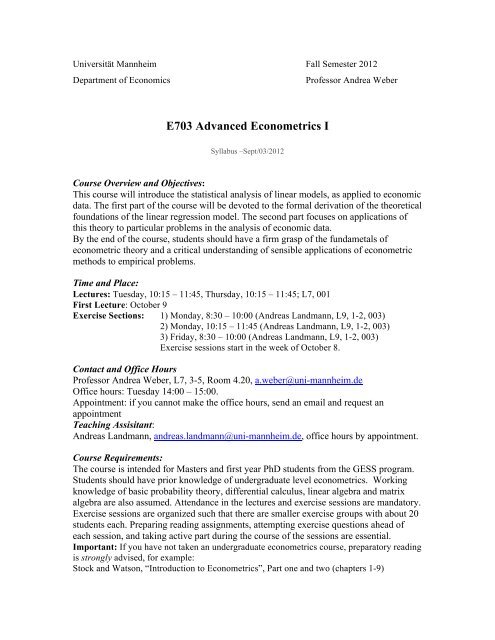
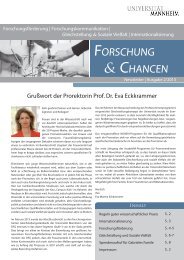
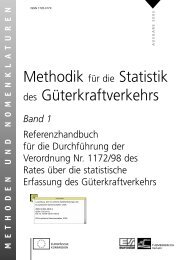
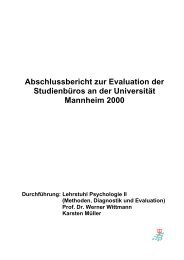
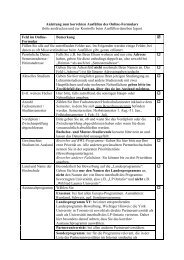
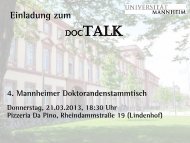
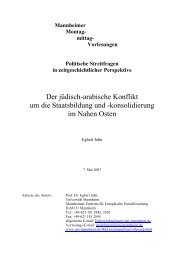
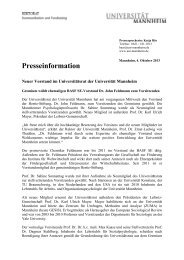
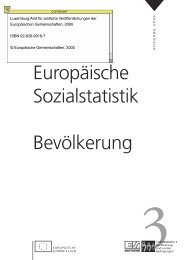
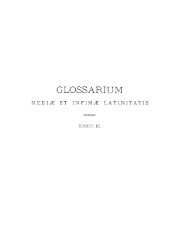
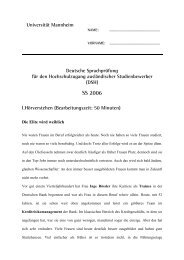
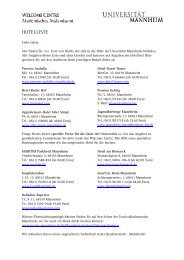
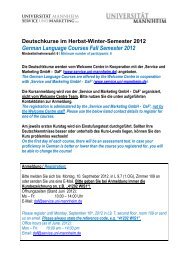
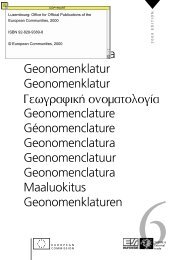
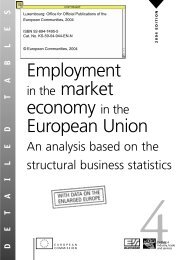
![226. [Augsburg], 27. Oktober 1562 An Joachim Camerarius d. Ã ...](https://img.yumpu.com/27559109/1/184x260/226-augsburg-27-oktober-1562-an-joachim-camerarius-d-a-.jpg?quality=85)